Resume
Charge Nurse Cover Letter Examples

May 29, 2025
|
12 min read
Craft a charge nurse cover letter that charges up your career, showcasing your leadership and patient care skills. Learn how to make your application pulse with energy and professionalism, drawing attention from hiring managers.
4.70 Average rating
Rated by 348 people
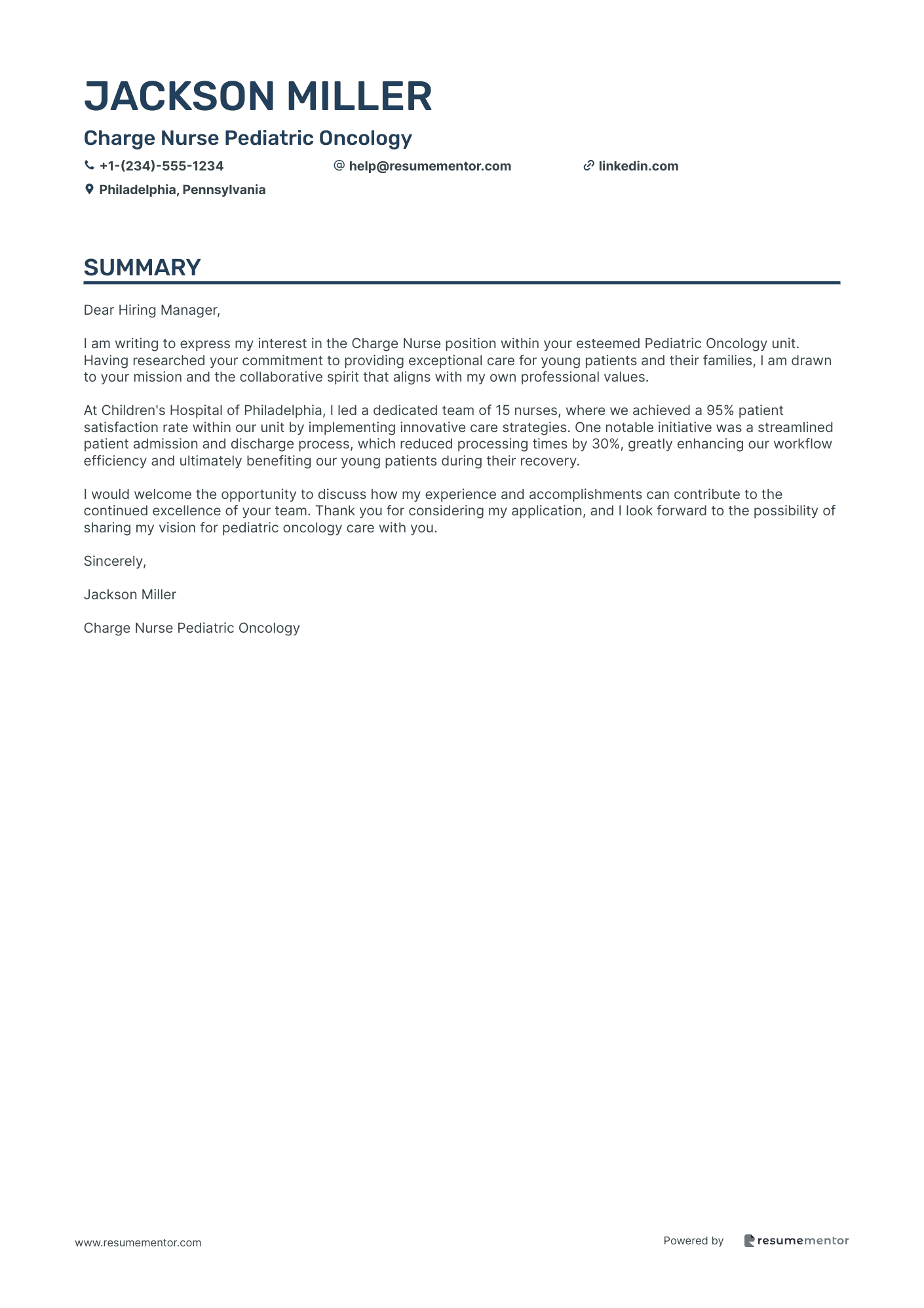
Charge Nurse Pediatric Oncology
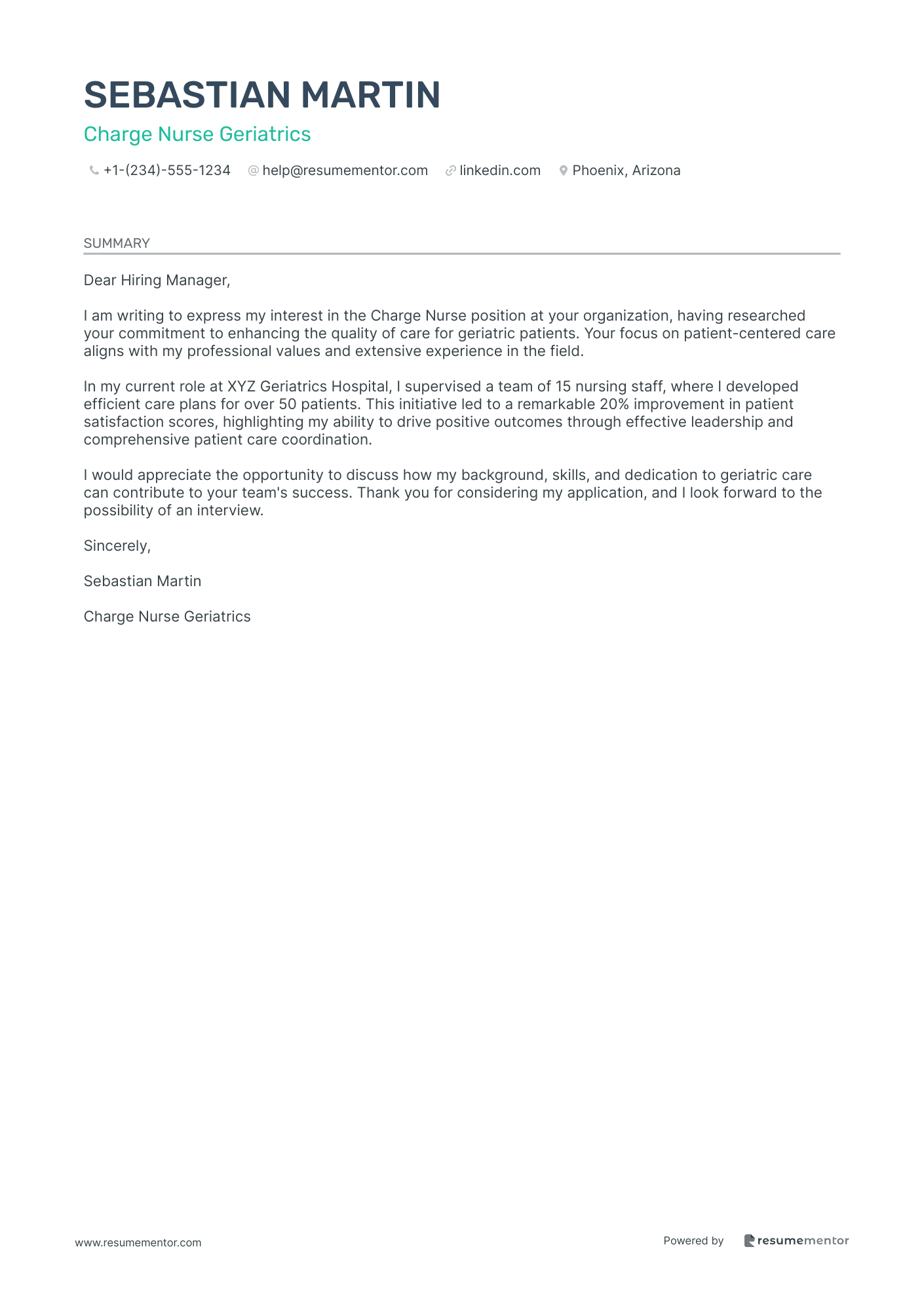
Charge Nurse Geriatrics
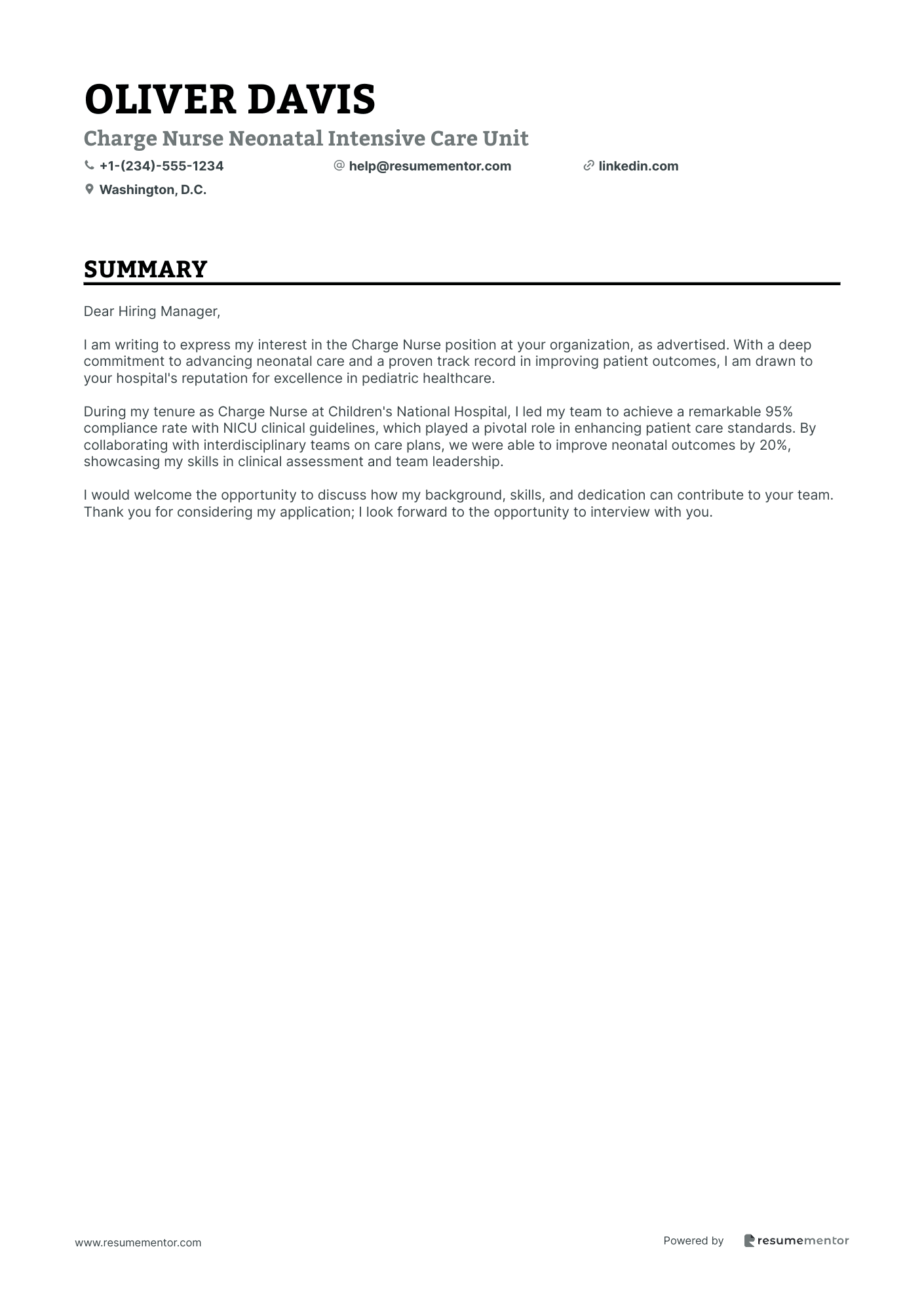
Charge Nurse Neonatal Intensive Care Unit
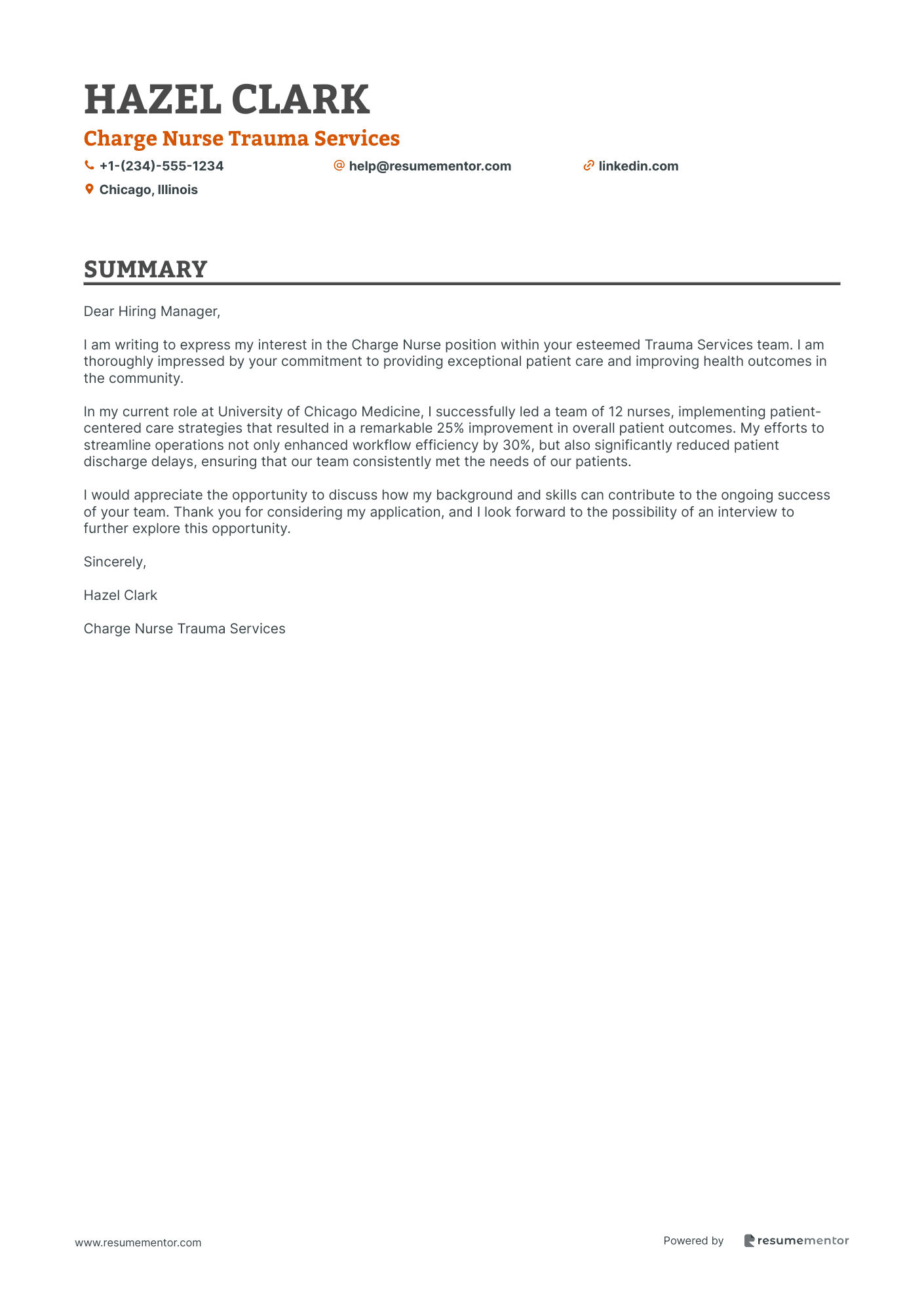
Charge Nurse Trauma Services
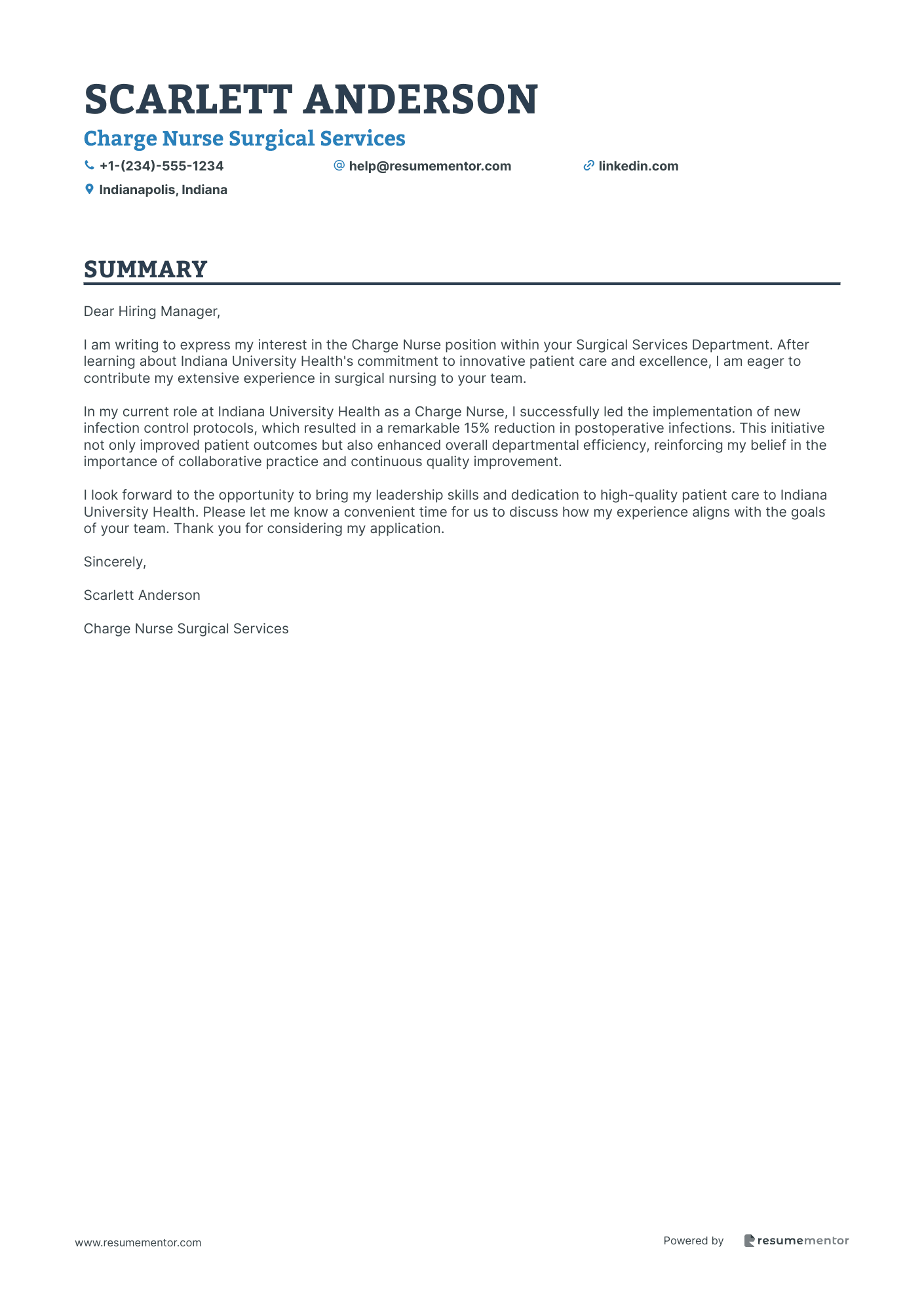
Charge Nurse Surgical Services
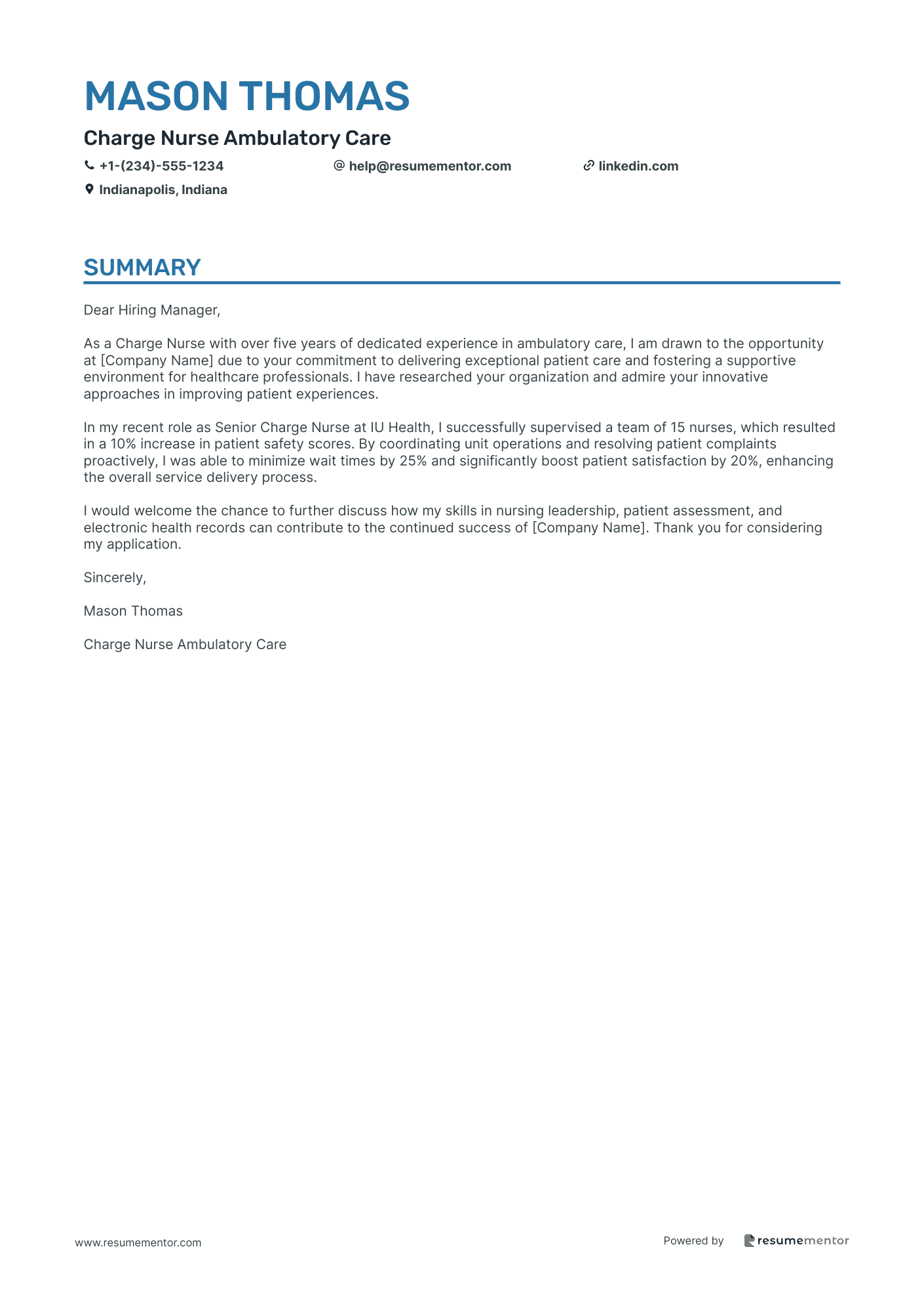
Charge Nurse Ambulatory Care
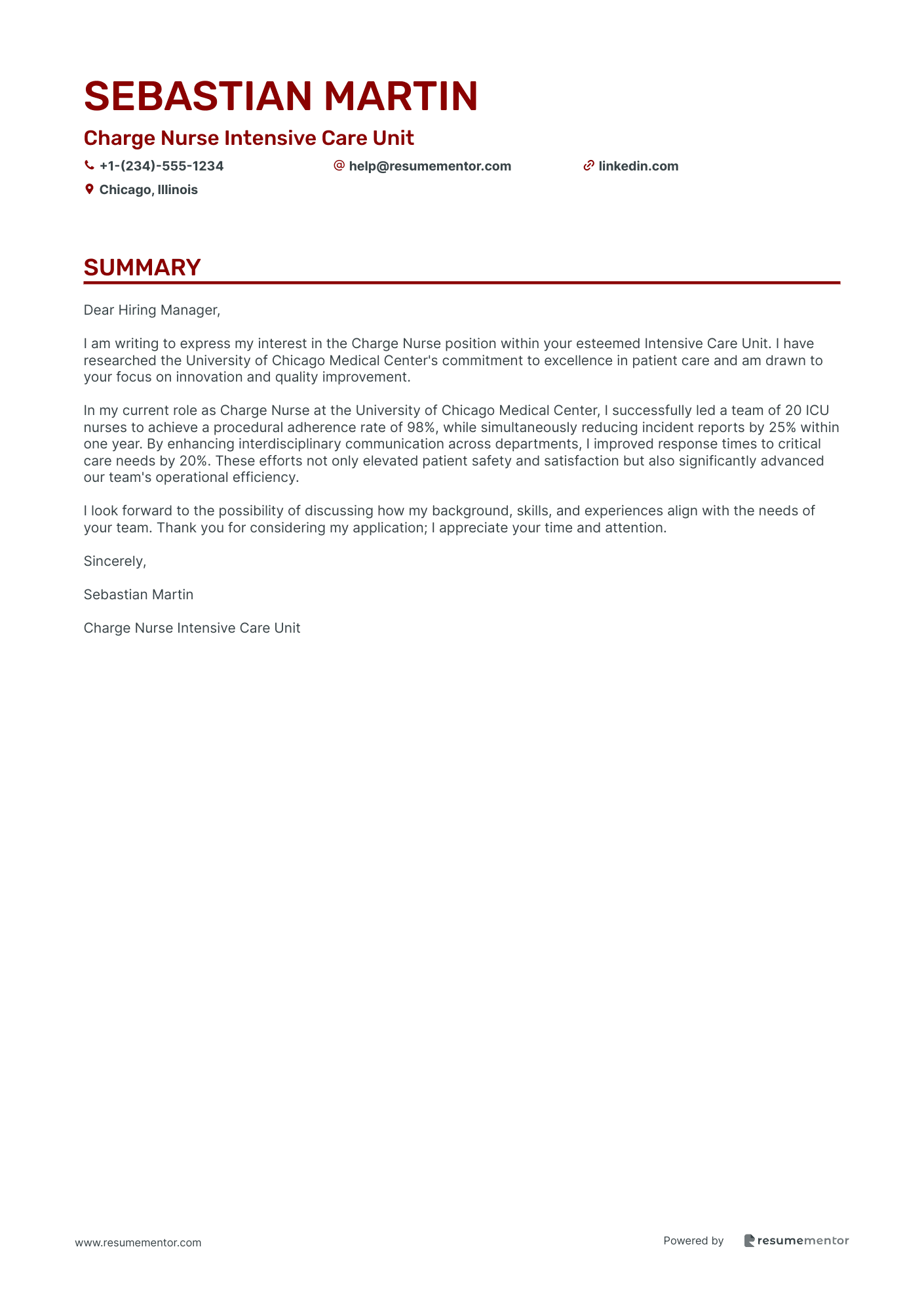
Charge Nurse Intensive Care Unit
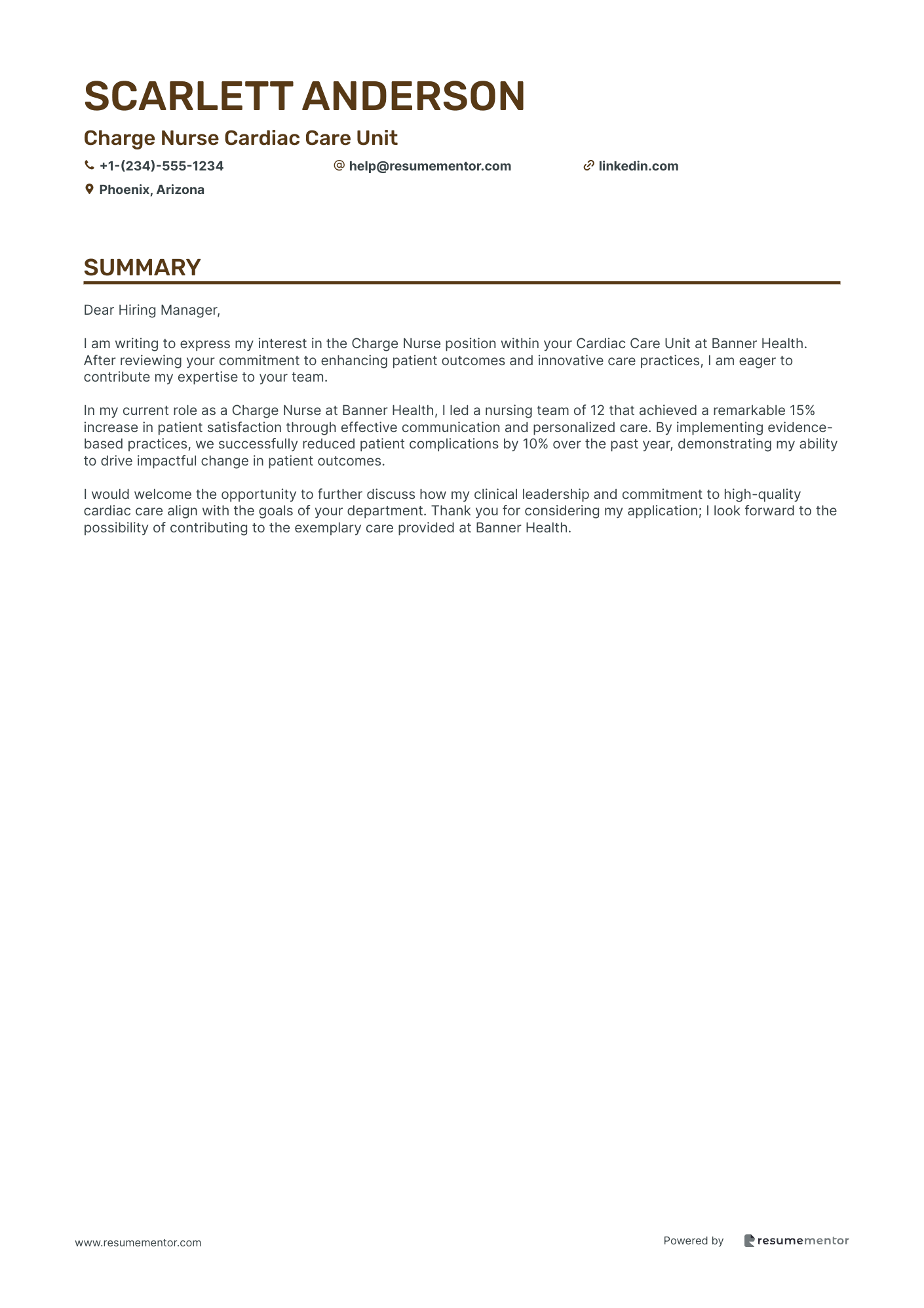
Charge Nurse Cardiac Care Unit
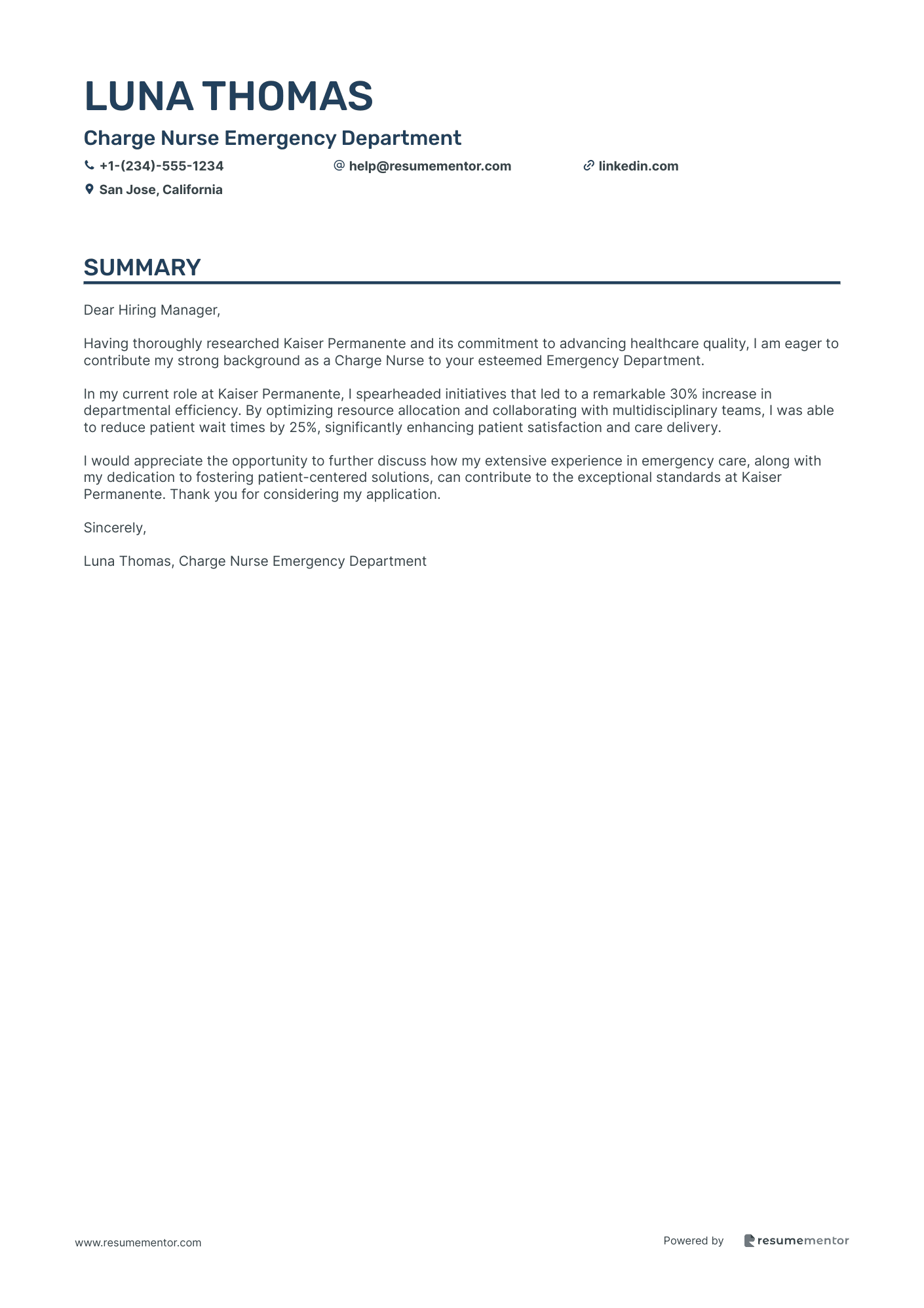
Charge Nurse Emergency Department
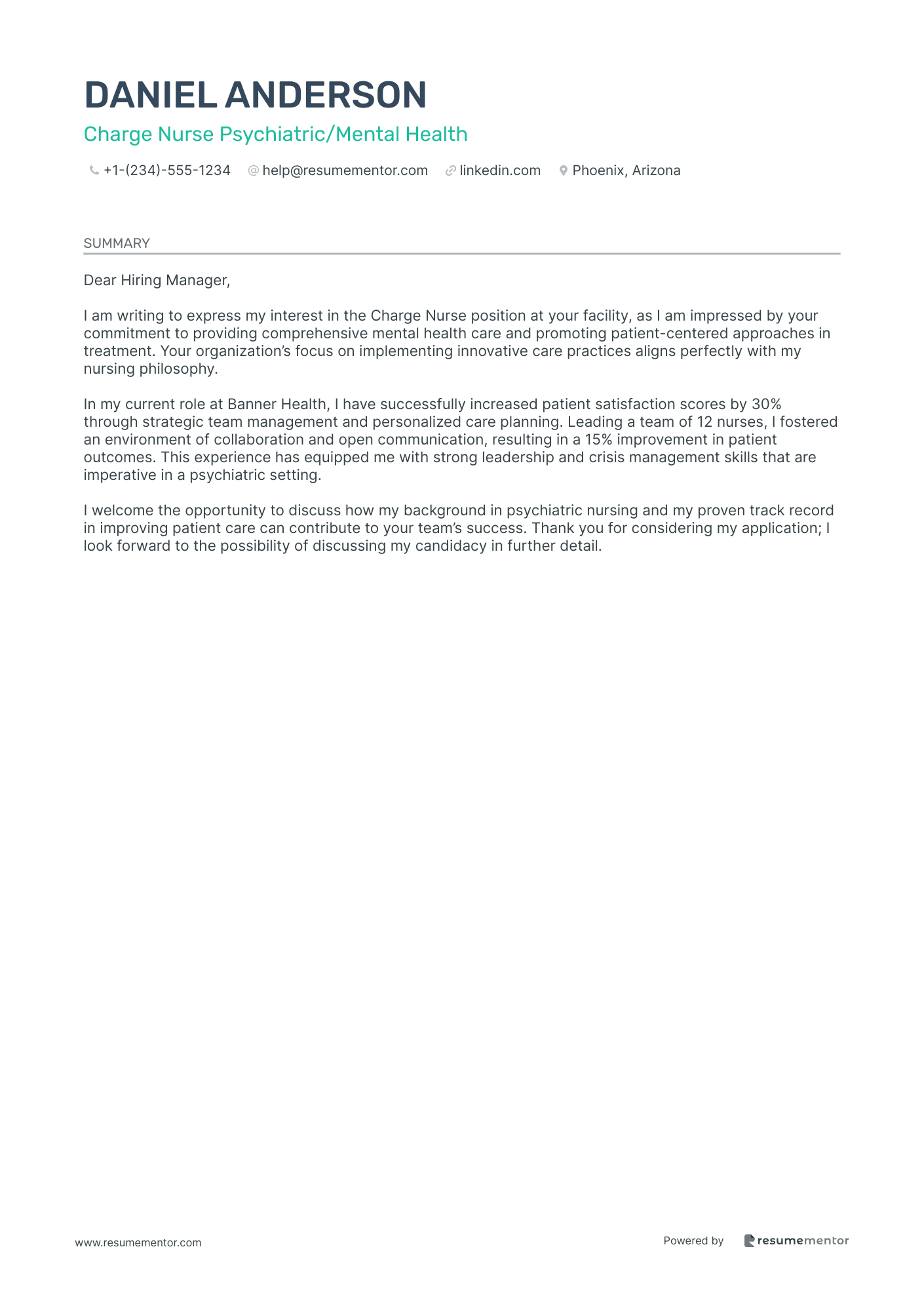
Charge Nurse Psychiatric/Mental Health

Charge Nurse Pediatric Oncology cover letter sample
In your cover letter, emphasize your clinical experience in pediatric care and oncology. Highlight any specific training in managing complex treatments and emotional support for young patients and their families. Mention your ability to coordinate with interdisciplinary teams to ensure comprehensive care. Discuss how you have implemented protocols that improved patient outcomes or safety. Use data or anecdotes to illustrate your leadership in stressful situations, showing your capability to manage both staff and patients effectively. Focus on your commitment to continuous education and staying updated with best practices.
Jackson Miller
Charge Nurse Pediatric Oncology
Summary
Dear Hiring Manager,
I am writing to express my interest in the Charge Nurse position within your esteemed Pediatric Oncology unit. Having researched your commitment to providing exceptional care for young patients and their families, I am drawn to your mission and the collaborative spirit that aligns with my own professional values.
At Children's Hospital of Philadelphia, I led a dedicated team of 15 nurses, where we achieved a 95% patient satisfaction rate within our unit by implementing innovative care strategies. One notable initiative was a streamlined patient admission and discharge process, which reduced processing times by 30%, greatly enhancing our workflow efficiency and ultimately benefiting our young patients during their recovery.
I would welcome the opportunity to discuss how my experience and accomplishments can contribute to the continued excellence of your team. Thank you for considering my application, and I look forward to the possibility of sharing my vision for pediatric oncology care with you.
Sincerely,
Jackson Miller
Charge Nurse Pediatric Oncology
Charge Nurse Geriatrics cover letter sample
When applying for this position, it is essential to highlight any previous experience in geriatric nursing or related fields. Emphasize your ability to manage patient care plans and your experience with chronic illness management. Strong leadership and collaboration skills are vital; mention instances when you led a team or contributed to interdisciplinary care. Include any relevant certifications, such as gerontological nursing, to showcase your commitment. Finally, use specific examples to demonstrate how your interventions have improved patient outcomes, adhering to the 'skill-action-result' framework.
Sebastian Martin
Charge Nurse Geriatrics
Summary
Dear Hiring Manager,
I am writing to express my interest in the Charge Nurse position at your organization, having researched your commitment to enhancing the quality of care for geriatric patients. Your focus on patient-centered care aligns with my professional values and extensive experience in the field.
In my current role at XYZ Geriatrics Hospital, I supervised a team of 15 nursing staff, where I developed efficient care plans for over 50 patients. This initiative led to a remarkable 20% improvement in patient satisfaction scores, highlighting my ability to drive positive outcomes through effective leadership and comprehensive patient care coordination.
I would appreciate the opportunity to discuss how my background, skills, and dedication to geriatric care can contribute to your team's success. Thank you for considering my application, and I look forward to the possibility of an interview.
Sincerely,
Sebastian Martin
Charge Nurse Geriatrics
Charge Nurse Neonatal Intensive Care Unit cover letter sample
When applying for this position, emphasize your clinical experience in neonatal care and any certifications such as BLS or NRP. Highlight your ability to perform assessments and manage care plans for premature and critically ill infants. Include your leadership skills and how you've mentored junior staff or improved team dynamics. Provide specific examples of how your actions led to better patient outcomes or increased efficiency in the unit. Use a 'skill-action-result' format to showcase your contributions to the healthcare team.
Oliver Davis
Charge Nurse Neonatal Intensive Care Unit
Summary
Dear Hiring Manager,
I am writing to express my interest in the Charge Nurse position at your organization, as advertised. With a deep commitment to advancing neonatal care and a proven track record in improving patient outcomes, I am drawn to your hospital's reputation for excellence in pediatric healthcare.
During my tenure as Charge Nurse at Children's National Hospital, I led my team to achieve a remarkable 95% compliance rate with NICU clinical guidelines, which played a pivotal role in enhancing patient care standards. By collaborating with interdisciplinary teams on care plans, we were able to improve neonatal outcomes by 20%, showcasing my skills in clinical assessment and team leadership.
I would welcome the opportunity to discuss how my background, skills, and dedication can contribute to your team. Thank you for considering my application; I look forward to the opportunity to interview with you.
Charge Nurse Trauma Services cover letter sample
When applying for this role, focus on your clinical experience, particularly in trauma management and emergency care. Highlight any leadership roles or specialized training, such as certifications in Trauma Nursing or Advanced Cardiovascular Life Support. Provide concrete examples of how your swift decision-making and assessment skills improved patient outcomes during critical situations. Also, demonstrate your ability to collaborate with multidisciplinary teams and to mentor junior staff, showcasing how these contributions have enhanced operational efficiency and overall patient care within your department.
Hazel Clark
Charge Nurse Trauma Services
Summary
Dear Hiring Manager,
I am writing to express my interest in the Charge Nurse position within your esteemed Trauma Services team. I am thoroughly impressed by your commitment to providing exceptional patient care and improving health outcomes in the community.
In my current role at University of Chicago Medicine, I successfully led a team of 12 nurses, implementing patient-centered care strategies that resulted in a remarkable 25% improvement in overall patient outcomes. My efforts to streamline operations not only enhanced workflow efficiency by 30%, but also significantly reduced patient discharge delays, ensuring that our team consistently met the needs of our patients.
I would appreciate the opportunity to discuss how my background and skills can contribute to the ongoing success of your team. Thank you for considering my application, and I look forward to the possibility of an interview to further explore this opportunity.
Sincerely,
Hazel Clark
Charge Nurse Trauma Services
Charge Nurse Surgical Services cover letter sample
When you write your cover letter, focus on your clinical expertise and leadership experience in a surgical environment. Highlight your ability to manage a team effectively and handle complex cases. Include specific examples of how your leadership has improved patient outcomes or workflow efficiency, following a 'skill-action-result' format. If you have certifications in perioperative nursing or advanced life support, emphasize these to demonstrate your qualifications. Showcasing your strong communication skills is essential, as collaboration with surgeons and other staff is crucial in this role.
Scarlett Anderson
Charge Nurse Surgical Services
Summary
Dear Hiring Manager,
I am writing to express my interest in the Charge Nurse position within your Surgical Services Department. After learning about Indiana University Health's commitment to innovative patient care and excellence, I am eager to contribute my extensive experience in surgical nursing to your team.
In my current role at Indiana University Health as a Charge Nurse, I successfully led the implementation of new infection control protocols, which resulted in a remarkable 15% reduction in postoperative infections. This initiative not only improved patient outcomes but also enhanced overall departmental efficiency, reinforcing my belief in the importance of collaborative practice and continuous quality improvement.
I look forward to the opportunity to bring my leadership skills and dedication to high-quality patient care to Indiana University Health. Please let me know a convenient time for us to discuss how my experience aligns with the goals of your team. Thank you for considering my application.
Sincerely,
Scarlett Anderson
Charge Nurse Surgical Services
Charge Nurse Ambulatory Care cover letter sample
When applying for a leadership role in healthcare, emphasize your experience in managing nursing staff and coordinating patient care. Highlight your ability to implement quality improvement initiatives that enhance patient outcomes. If you've completed training in clinical leadership or care management, mention these along with their relevance to your role. Provide examples where your decision-making improved workflow efficiency or patient satisfaction scores, following the 'skill-action-result' framework. Show how your nursing background equips you to address patient needs effectively while maintaining regulatory compliance.
Mason Thomas
Charge Nurse Ambulatory Care
Summary
Dear Hiring Manager,
As a Charge Nurse with over five years of dedicated experience in ambulatory care, I am drawn to the opportunity at [Company Name] due to your commitment to delivering exceptional patient care and fostering a supportive environment for healthcare professionals. I have researched your organization and admire your innovative approaches in improving patient experiences.
In my recent role as Senior Charge Nurse at IU Health, I successfully supervised a team of 15 nurses, which resulted in a 10% increase in patient safety scores. By coordinating unit operations and resolving patient complaints proactively, I was able to minimize wait times by 25% and significantly boost patient satisfaction by 20%, enhancing the overall service delivery process.
I would welcome the chance to further discuss how my skills in nursing leadership, patient assessment, and electronic health records can contribute to the continued success of [Company Name]. Thank you for considering my application.
Sincerely,
Mason Thomas
Charge Nurse Ambulatory Care
Charge Nurse Intensive Care Unit cover letter sample
Highlight your extensive clinical experience in critical care settings. It's important to mention any specialized training, such as Advanced Cardiac Life Support (ACLS) or certifications in trauma care. Strong leadership skills are essential, so discuss how you've effectively managed a team or coordinated care under pressure. Provide specific examples of critical decisions you've made that improved patient outcomes. Use the 'skill-action-result' format to demonstrate your contributions, such as how your intervention led to faster recovery times or reduced complications for patients in high-stress situations.
Sebastian Martin
Charge Nurse Intensive Care Unit
Summary
Dear Hiring Manager,
I am writing to express my interest in the Charge Nurse position within your esteemed Intensive Care Unit. I have researched the University of Chicago Medical Center's commitment to excellence in patient care and am drawn to your focus on innovation and quality improvement.
In my current role as Charge Nurse at the University of Chicago Medical Center, I successfully led a team of 20 ICU nurses to achieve a procedural adherence rate of 98%, while simultaneously reducing incident reports by 25% within one year. By enhancing interdisciplinary communication across departments, I improved response times to critical care needs by 20%. These efforts not only elevated patient safety and satisfaction but also significantly advanced our team's operational efficiency.
I look forward to the possibility of discussing how my background, skills, and experiences align with the needs of your team. Thank you for considering my application; I appreciate your time and attention.
Sincerely,
Sebastian Martin
Charge Nurse Intensive Care Unit
Charge Nurse Cardiac Care Unit cover letter sample
When applying for this role, it is essential to highlight your experience in critical care settings. Emphasize your ability to manage high-stress situations and coordinate patient care among multidisciplinary teams. Mention any certifications in advanced cardiac life support (ACLS) or similar programs, as these showcase your commitment to ongoing education. Provide specific examples where your leadership improved patient outcomes or enhanced team efficiency. Use the 'skill-action-result' format to demonstrate how your actions directly impacted patient care and team performance in previous roles.
Scarlett Anderson
Charge Nurse Cardiac Care Unit
Summary
Dear Hiring Manager,
I am writing to express my interest in the Charge Nurse position within your Cardiac Care Unit at Banner Health. After reviewing your commitment to enhancing patient outcomes and innovative care practices, I am eager to contribute my expertise to your team.
In my current role as a Charge Nurse at Banner Health, I led a nursing team of 12 that achieved a remarkable 15% increase in patient satisfaction through effective communication and personalized care. By implementing evidence-based practices, we successfully reduced patient complications by 10% over the past year, demonstrating my ability to drive impactful change in patient outcomes.
I would welcome the opportunity to further discuss how my clinical leadership and commitment to high-quality cardiac care align with the goals of your department. Thank you for considering my application; I look forward to the possibility of contributing to the exemplary care provided at Banner Health.
Charge Nurse Emergency Department cover letter sample
When crafting your cover letter, it's important to highlight your clinical experience in fast-paced environments. Showcase your ability to lead teams and manage various patient cases effectively. Emphasize your certifications in advanced life support or trauma care, as these qualifications demonstrate readiness for critical situations. Use specific examples to illustrate how you've improved patient outcomes or streamlined procedures. A 'skill-action-result' format can help convey your impact, showing how your leadership and decision-making have directly benefited your team and organization.
Luna Thomas
Charge Nurse Emergency Department
Summary
Dear Hiring Manager,
Having thoroughly researched Kaiser Permanente and its commitment to advancing healthcare quality, I am eager to contribute my strong background as a Charge Nurse to your esteemed Emergency Department.
In my current role at Kaiser Permanente, I spearheaded initiatives that led to a remarkable 30% increase in departmental efficiency. By optimizing resource allocation and collaborating with multidisciplinary teams, I was able to reduce patient wait times by 25%, significantly enhancing patient satisfaction and care delivery.
I would appreciate the opportunity to further discuss how my extensive experience in emergency care, along with my dedication to fostering patient-centered solutions, can contribute to the exceptional standards at Kaiser Permanente. Thank you for considering my application.
Sincerely,
Luna Thomas, Charge Nurse Emergency Department
Charge Nurse Psychiatric/Mental Health cover letter sample
When applying for this position, it's important to underscore any previous experience in psychiatric nursing or mental health care. Highlight specific training in crisis intervention, behavioral management, or therapeutic communication. If you have certifications such as Advanced Practice Psychiatric Nurse or similar credentials, be sure to include these as they demonstrate your commitment to the field. Use concrete examples of how your interventions improved patient outcomes or fostered team collaboration, framing your achievements in a 'skill-action-result' format to clearly show the impact of your work.
Daniel Anderson
Charge Nurse Psychiatric/Mental Health
Summary
Dear Hiring Manager,
I am writing to express my interest in the Charge Nurse position at your facility, as I am impressed by your commitment to providing comprehensive mental health care and promoting patient-centered approaches in treatment. Your organization’s focus on implementing innovative care practices aligns perfectly with my nursing philosophy.
In my current role at Banner Health, I have successfully increased patient satisfaction scores by 30% through strategic team management and personalized care planning. Leading a team of 12 nurses, I fostered an environment of collaboration and open communication, resulting in a 15% improvement in patient outcomes. This experience has equipped me with strong leadership and crisis management skills that are imperative in a psychiatric setting.
I welcome the opportunity to discuss how my background in psychiatric nursing and my proven track record in improving patient care can contribute to your team’s success. Thank you for considering my application; I look forward to the possibility of discussing my candidacy in further detail.
Related Articles

Continue Reading
Check more recommended readings to get the job of your dreams.
Resume
Resources
Tools
© 2026. All rights reserved.
Made with love by people who care.
